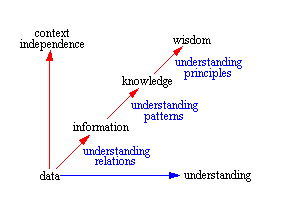http://www.systems-thinking.org/kmgmt/kmgmt.htm
"
- A collection of data is not information.
- A collection of information is not knowledge.
- A collection of knowledge is not wisdom.
- A collection of wisdom is not truth.
 The idea is that information, knowledge, and wisdom are more than simply collections. Rather, the whole represents more than the sum of its parts and has a synergy of its own.
The idea is that information, knowledge, and wisdom are more than simply collections. Rather, the whole represents more than the sum of its parts and has a synergy of its own.
We begin with data, which is just a meaningless point in space and time, without reference to either space or time. It is like an event out of context, a letter out of context, a word out of context. The key concept here being "out of context." And, since it is out of context, it is without a meaningful relation to anything else. When we encounter a piece of data, if it gets our attention at all, our first action is usually to attempt to find a way to attribute meaning to it. We do this by associating it with other things. If I see the number 5, I can immediately associate it with cardinal numbers and relate it to being greater than 4 and less than 6, whether this was implied by this particular instance or not. If I see a single word, such as "time," there is a tendency to immediately form associations with previous contexts within which I have found "time" to be meaningful. This might be, "being on time," "a stitch in time saves nine," "time never stops," etc. The implication here is that when there is no context, there is little or no meaning. So, we create context but, more often than not, that context is somewhat akin to conjecture, yet it fabricates meaning."
No comments:
Post a Comment